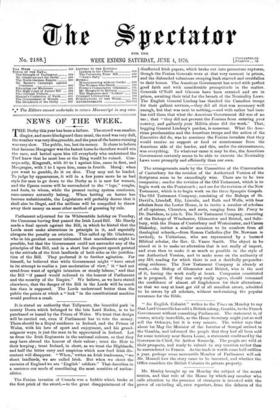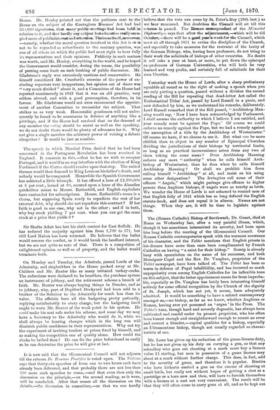Mr. Henley brought up on Monday the subject of the
secret session, and that rule of the House by which any member who calls attention to the presence of strangers is invested with the power of excluding all, even reporters, from the debates of the
House. Mr. Henley pointed out that the petitions sent to the House on the subject of the Contagious Diseases' Act had had 333,000 signatusuk that stany-publle- meetings had beera WI& in relation to it, and that hardly any subject buteducation really mew- pied more of publitrintereatanchattentioui Theissuitiksel‘morcoveg. —namely, whether the moral question involved in this Act is or not to be regarded as subordinate to the sanitary question, was one of all others on which the public had most right to hear fully its representatives and their opinions. Publicity in such matters was worth, said Mr. Henley, everything in the world, and he hoped the Government would consider, during the recess, the possibility of putting some limit on such hushing of public discussion. Mr. Gladstone's reply was excessively cautious and conservative. He himself considered Mr. Craufurd's exercise of the power of ex- cluding reporters very inopportune, but opinion out of doors was "very much divided" about it, and a Committee of the House had reported unanimously in 1849 that it was an old practice, very seldom abused, and with a good presumption, therefore, in its favour. Mr. Gladstone would not even recommend the appoint- ment of another Committee to reconsider the subject. That strikes us as very weak. Honourable gentlemen will not unfre- quently be found to be unanimous in defence of anything like a privilege, and if the House had resolved that on the demand of any member the voting should be secret as well as the speaking, we do not doubt there would be plenty of advocates for it. Why not give a single member the arbitrary power of vetoing a debate altogether ? It would be just as sensible.































